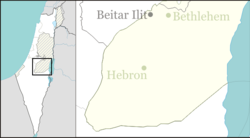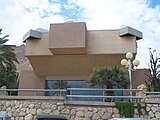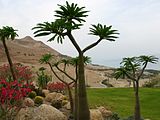Ein Gedi (kibbutz)
Ein Gedi
עֵין גֶּדִי عين جدي | |
|---|---|
 | |
| Coordinates: 31°27′8″N 35°23′7″E / 31.45222°N 35.38528°E | |
| Country | Israel |
| District | Southern |
| Council | Tamar |
| Affiliation | Kibbutz Movement |
| Founded | 1953 |
| Founded by | Nahal |
| Population (2022)[1] | 604 |
| Website | www |
Ein Gedi (Hebrew: עֵין גֶּדִי, lit. 'Spring [of the] Kid') is a kibbutz on the western shore of the Dead Sea in Israel. Located on the edge of the Judaean Desert at the site of historic Ein Gedi, it falls under the jurisdiction of Tamar Regional Council. In 2022 it had a population of 604.[1]
History
[edit]The kibbutz was founded in 1953.[2] It was named after the ancient Jewish city of Ein Gedi, located on Tel Goren (Arabic: Tell el-Jurn) beside the kibbutz. Located on the edge of the Green Line separating Israel from the Jordanian-held West Bank, the kibbutz was completely isolated in the desert, the nearest Israeli village being several hours away via a dirt road. After the 1967 Six-Day War and Israel's capture of the West Bank from Jordan, a road was paved from Jerusalem via Jericho and along the shore of the Dead Sea. This essentially ended the kibbutz's isolation and opened the door to its development.
The gradual drying of the Dead Sea over a period of several decades has led to sinkholes appearing around it. This affected Ein Gedi, with hundreds appearing annually by the early 21st century; two people fell into sinkholes in the 1990s. The sinkholes and changing environment around the Dead Sea impacted the kibbutz's infrastructure and economy: a road had to be diverted and a newly built bridge abandoned due to safety concerns, the campsite was closed, and the Ein Gedi Spa was closed as it was no longer near the shore.[3]
Economy
[edit]Ein Gedi is primarily involved with agriculture and tourism of the surrounding area and neighboring antiquities. In 1997, the kibbutz opened a facility to bottle the water of the Ein Gedi spring. The product is known as Ein Gedi Mineral Water. This led to controversy regarding the reselling of a public resource.
Botanical garden
[edit]The kibbutz operates a 100 dunam (10 ha, 24.7 acre) botanical garden housing over 900 plant species from around the world. It is the only populated botanical garden in the world,[4] with 500 residents.[citation needed] The garden joined the register of the Botanic Gardens Conservation International in 1994.[4] The garden includes date palms and Arecaceae, tropical and desert flora.[4][5]
Climate
[edit]Ein Gedi has a hot desert climate (Köppen climate classification: BWh). The average annual temperature is 23.9 °C (75.0 °F), and around 107 mm (4.21 in) of precipitation falls annually.
| Climate data for Ein Gedi | |||||||||||||
|---|---|---|---|---|---|---|---|---|---|---|---|---|---|
| Month | Jan | Feb | Mar | Apr | May | Jun | Jul | Aug | Sep | Oct | Nov | Dec | Year |
| Mean daily maximum °C (°F) | 20.4 (68.7) |
22 (72) |
25.5 (77.9) |
29.9 (85.8) |
34.4 (93.9) |
37 (99) |
38.3 (100.9) |
38.1 (100.6) |
35.9 (96.6) |
33.2 (91.8) |
28.4 (83.1) |
22.3 (72.1) |
30.5 (86.9) |
| Daily mean °C (°F) | 15.1 (59.2) |
16.2 (61.2) |
19.1 (66.4) |
22.9 (73.2) |
26.9 (80.4) |
29.6 (85.3) |
31 (88) |
31.3 (88.3) |
29.6 (85.3) |
26.6 (79.9) |
21.9 (71.4) |
16.8 (62.2) |
23.9 (75.1) |
| Mean daily minimum °C (°F) | 9.8 (49.6) |
10.5 (50.9) |
12.7 (54.9) |
16 (61) |
19.5 (67.1) |
22.2 (72.0) |
23.8 (74.8) |
24.5 (76.1) |
23.3 (73.9) |
20.1 (68.2) |
15.4 (59.7) |
11.4 (52.5) |
17.4 (63.4) |
| Average precipitation mm (inches) | 26 (1.0) |
17 (0.7) |
15 (0.6) |
5 (0.2) |
2 (0.1) |
0 (0) |
0 (0) |
0 (0) |
0 (0) |
3 (0.1) |
15 (0.6) |
24 (0.9) |
107 (4.2) |
| Source: [6] | |||||||||||||
Eco park
[edit]The kibbutz is home to the Ein Gedi Eco Park, which functions as both a zoo and an environmental education center, demonstrating sustainable technologies such as solar cookers, greywater systems, mud buildings, and compost toilets.[citation needed]
Marathon race
[edit]The Ein Gedi race, also known as the Shalom Marathon – Dead Sea Half Marathon is a popular road running event over several distances that has been held by the Tamar Regional Council since 1983. The starting point for all races is the Ein Gedi Spa, 80 kilometers (50 mi) southeast of Jerusalem and 4 kilometers south of Kibbutz Ein Gedi.[7][8]
Gallery
[edit]References
[edit]- ^ a b "Regional Statistics". Israel Central Bureau of Statistics. Retrieved 21 March 2024.
- ^ Bar-Am, Aviva (26 January 2010). "Ein Gedi, a streamlined approach". The Jerusalem Post. Retrieved 25 April 2019.
- ^ Arielli, Nir (2022). "Land, water and the changing Dead Sea environment: A microhistory of Kibbutz Ein Gedi". Journal of Israeli History. 40 (2): 247–248. doi:10.1080/13531042.2022.2186311.
- ^ a b c "Dead Sea Ein Gedi Botanic Garden", Botanic Gardens Conservation International. Re-accessed 16 Oct 2024.
- ^ Botanical garden thrives on the edge of the Dead Sea Travel with the Gardener [dead link]
- ^ "Climate: Ein Gedi". September 2019.
- ^ "Ein-Gedi Race" Archived February 10, 2010, at the Wayback Machine
- ^ Yagna, Yanir (2008-04-02). "Runners collapse near Dead Sea as temperatures hit seasonal highs". Haaretz.com. Retrieved 2011-11-24.




